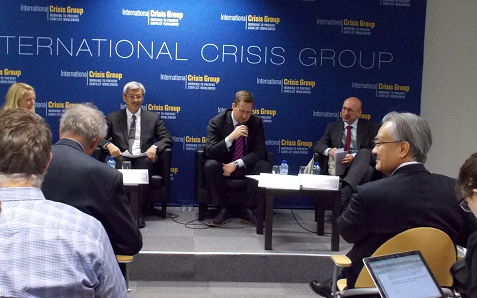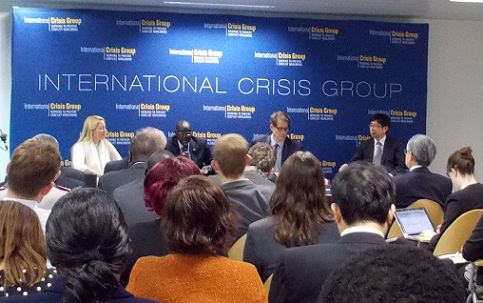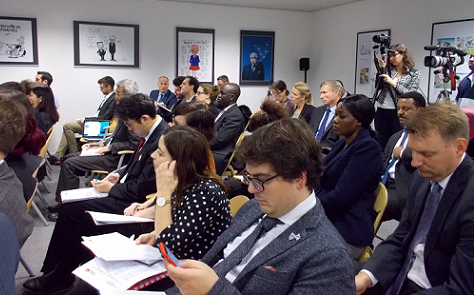Fateful Turning Point (No.26)
Simultaneous Terrorist Attacks in Paris
On the 13th of November, simultaneous terrorist attacks occurred in Paris, taking the lives of no less than 130 people. I pray sincerely for the repose of these souls.
These terrorist attacks are said to be carried out by people with a French or Belgian citizenship. Even here in Brussels the terror threat level was raised to maximum of 4 (a terrorist attack is imminent, critical situation) in the early morning of 21 November, causing the schools and the subway system to completely shut down until 24 November. From the 25th, both the metro system and the schools started to revert back to normal and on the 26th of November, the terror threat level was lowered from maximum level 4 to level 3 (terrorist attacks may possibly occur) for the entire country. Nevertheless, I would like to ask all, especially those Japanese who are visiting Belgium or those who are living here, to keep on checking the Embassy’s homepage as well as the consular service’s safety bulletin and to be very careful.
South Sudan and Japan
 On a different note, in the afternoon of 17 November, our Embassy co-hosted a seminar on “Challenges for South Sudan and the Role of the International Community” with the international think-tank ICG (International Crisis Group) at the Press Club in Brussels. Minister of Foreign Affairs of South Sudan, Mr. Benjamin, who attended the EU-Africa Summit on the migration issue in Malta, extended his journey to Brussels to participate in this seminar as well. The minister not only delivered a keynote speech, but he attended the entire seminar from 14:00h to 18:00h and gave several comments. The conference hall was chockfull and I could tell the attendees were genuinely interested. On a different note, in the afternoon of 17 November, our Embassy co-hosted a seminar on “Challenges for South Sudan and the Role of the International Community” with the international think-tank ICG (International Crisis Group) at the Press Club in Brussels. Minister of Foreign Affairs of South Sudan, Mr. Benjamin, who attended the EU-Africa Summit on the migration issue in Malta, extended his journey to Brussels to participate in this seminar as well. The minister not only delivered a keynote speech, but he attended the entire seminar from 14:00h to 18:00h and gave several comments. The conference hall was chockfull and I could tell the attendees were genuinely interested.
The president of the ICG, the French Mr. Guéhenno, is a former Under-Secretary General of the UN’s PKO and is considered to be one of the top five most famous big thinkers in Europe. The ICG might not be that well-known in Japan, but it’s a Brussels-based think tank established originally with the aim to sense international issues before they escalate and have high level board members such as former presidents transmit these issues internationally to encourage a solution through the involvement of the international community. Their goal has remained unchanged and their strongest point is that they post people in the problem areas in question, especially in conflict areas, which provide excellent firsthand information and analysis. At our seminar as well, ICG analyst Ms. Copeland, who has resided in the country in question for a long time and is therefore very well informed, was one of the panelists and held a very down-to-earth discussion.
 I think a lot of you know this, but since January 2012, just right after the independence of South Sudan in July of 2011, Japan dispatched Self-Defense Force engineering units to the capital Juba as a part of UN Peace Keeping Operations. Currently, there are around 350 military engineers who support the independent development of South Sudan by making use of the Self-Defense Force’s field of specialty, namely the building of infrastructure, also in close coordination with ODA and NGO’s. I think a lot of you know this, but since January 2012, just right after the independence of South Sudan in July of 2011, Japan dispatched Self-Defense Force engineering units to the capital Juba as a part of UN Peace Keeping Operations. Currently, there are around 350 military engineers who support the independent development of South Sudan by making use of the Self-Defense Force’s field of specialty, namely the building of infrastructure, also in close coordination with ODA and NGO’s.
Furthermore, the office of JICA is in Juba, where in very difficult circumstances specialists help with developments that meet the demands of the local people by, for example, making a master plan for the development of agriculture in South Sudan.
Why South Sudan?
 Well then, why South Sudan? Before its independence, Sudan was the 6th biggest African country with a population of nearly 50 million people and with the largest surface area. The now independent South Sudan has only a population of 11 million, but it has its own oil fields, which makes it a country with a lot of potential for development. It is possible to guide such a young country like this in the right direction by making full use of Peacekeeping Operations (PKO) and Official Development Assistance (ODA) if the international community combines efforts at an early stage to respond to the needs. Well then, why South Sudan? Before its independence, Sudan was the 6th biggest African country with a population of nearly 50 million people and with the largest surface area. The now independent South Sudan has only a population of 11 million, but it has its own oil fields, which makes it a country with a lot of potential for development. It is possible to guide such a young country like this in the right direction by making full use of Peacekeeping Operations (PKO) and Official Development Assistance (ODA) if the international community combines efforts at an early stage to respond to the needs.
On the other hand, when looking at other regions in Africa, we can see the existence of the recently much talked about “Fragile States”. Not a few countries have a weak government that is not only unable to provide basic services, but is also unable to control its national borders, which leads to an inflow of extremists. It is becoming a serious problem. Without the cooperation of the international community at an early stage, the situation will get worse and worse until there is in the end no other choice than a “military response”. South Sudan is exactly on that kind of fateful turning point, and we are rightly proud that a country like Japan is cooperating to lead its future in the right direction.
Ownership, Partnership & Commitment
 Ambassador Kiya of the Japanese Embassy in South Sudan and Mr. Furukawa, Chief of the JICA Office were so kind as to come over especially for this seminar and were very active as panelists. Daily life there seems to be extremely difficult and I therefore take my hat off for their daily efforts to help develop South Sudan. Ambassador Kiya of the Japanese Embassy in South Sudan and Mr. Furukawa, Chief of the JICA Office were so kind as to come over especially for this seminar and were very active as panelists. Daily life there seems to be extremely difficult and I therefore take my hat off for their daily efforts to help develop South Sudan.
What became clear to me throughout the seminar is the importance of the three keywords in the subtitle. The ownership of the people of South Sudan of the process, the partnership of the international community for cooperation and the commitment of the people involved. I felt that above all, it is important that the people of South Sudan should be able to, as for their own problems, advance the development process with ownership. I would like to express my heartfelt thanks to everyone who was involved in this seminar for the cooperation to make it happen.
|